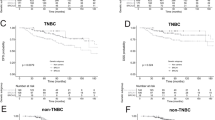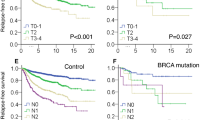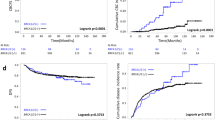Abstract
Purpose
The debate concerning poorer survival for patients with breast cancer (BC) carrying a BRCA1 germline mutation is unresolved, and requires additional data from population-based studies.
Patients and methods
We followed 232 women with invasive BC under age 46, ascertained prospectively through a French population-based BC registry and tested for BRCA1/2 mutations (median follow-up: 82 months). We compared tumour characteristics and survival rates between 21 BRCA1/2 deleterious mutation carriers and 211 non-carriers.
Results
As compared to sporadic tumours, BRCA1/2 tumours showed higher grade (P = 0.02), fewer ductal carcinoma in situ (P = 0.02), more frequent medullary histology (P = 0.02), more frequent negative oestrogen and progesterone receptors (P = 0.001 each). At 5 years, BC-specific survival, metastasis-free survival, ipsilateral recurrence-free survival and contralateral BC-free survival rates for BRCA1/2 mutation carriers were 95.0%, 94.7%, 100% and 90.0% respectively, compared with 89.6%, 78.2%, 88.8% and 94.4% respectively, for non-carriers (not significant). Rates for women carrying only a BRCA1 mutation were 93.3%, 93.3%, 100%, 86.7%, respectively. 76% of BRCA1/2 carriers received chemotherapy.
Conclusion
Despite unfavourable tumour features, we found no evidence for poorer short-term survival in BRCA1 mutation carriers compared to non-carriers in this prospective population-based cohort. The high rate of BRCA1 carriers who received chemotherapy for their BC should question the positive impact of this treatment, as suggested by preclinical studies showing increased chemosensitivity of BRCA1-associated tumours.
Similar content being viewed by others
Explore related subjects
Discover the latest articles and news from researchers in related subjects, suggested using machine learning.References
Garber JE, Offit K (2005) Hereditary cancer predisposition syndromes. J Clin Oncol 23:276–292
Miki Y, Swensen J, Shattuck-Eidens D, Futreal PA, Harshman K, Tavtigian S, Liu Q, Cochran C, Bennett LM, Ding W et al (1994) A strong candidate for the breast and ovarian cancer susceptibility gene BRCA1. Science 265:1088–2090
Wooster R, Bignell G, Lancaster J, Swift S, Seal S, Mangion J, Collins N, Gregory S, Gumbs C, Micklem G (1995) Identification of the breast cancer susceptibility gene BRCA2. Nature 378:789–792
Tavtigian SV, Simard J, Rommens J, Couch F, Shattuck Eidens D, Neuhausen S, Merajver S, Thorlacius S, Offit K, Stoppa-Lyonnet D, Belanger C, Bell R, Berry S, Bogden R, Chen Q, Davis T, Dumont M, Frye C, Hattier T, Jammulapati S, Janecki T, Jiang P, Kehrer R, Leblanc JF, Mitchell JT, McArthur-Morrison J, Nguyen K, Peng Y, Samson C, Schroeder M, Snyder SC, Steele L, Stringfellow M, Stroup C, Swedlund B, Swense J, Teng D, Thomas A, Tran T, Tranchant M, Weaver-Feldhaus J, Wong AK, Shizuya H, Eyfjord JE, Cannon-Albright L, Tranchant M, Labrie F, Skolnick MH, Weber B, Kamb A, Goldgar DE (1996) The complete BRCA2 gene and mutations in chromosome 13q-linked kindreds. Nat Genet 12:333–337
Foulkes WD, Wong N, Brunet JS, Begin LR, Zhang JC, Martinez JJ, Rozen F, Tonin PN, Narod SA, Karp SE, Pollak MN (1997) Germ-line BRCA1 mutation is an adverse prognostic factor in Ashkenazi Jewish women with breast cancer. Clin Cancer Res 3:2465–2469
Johannsson OT, Ranstam J, Borg A, Olsson H (1998) Survival of BRCA1 breast and ovarian cancer patients: a population-based study from southern Sweden. J Clin Oncol 16:397–404
Ansquer Y, Gautier C, Fourquet A, Asselain B, Stoppa-Lyonnet D (1998) Survival in early-onset BRCA1 breast-cancer patients. Institut Curie Breast Cancer Group. Lancet 352:541
Robson M, Levin D, Federici M, Satagopan J, Bogolminy F, Heerdt A, Borgen P, McCormick B, Hudis C, Norton L, Boyd J, Offit K (1999) Breast conservation therapy for invasive breast cancer in Ashkenazi women with BRCA gene founder mutations. J Natl Cancer Inst 91:2112–2117
Foulkes WD, Chappuis PO, Wong N, Brunet JS, Vesprini D, Rozen F, Yuan ZQ, Pollak MN, Kuperstein G, Narod SA, Begin LR (2000) Primary node negative breast cancer in BRCA1 mutation carriers has a poor outcome. Ann Oncol 11:307–313
Stoppa-Lyonnet D, Ansquer Y, Dreyfus H, Gautier C, Gauthier-Villars M, Bourstyn E, Clough KB, Magdelenat H, Pouillart P, Vincent-Salomon A, Fourquet A, Asselain B (2000) Familial invasive breast cancers: worse outcome related to BRCA1 mutations. J Clin Oncol 18:4053–4059
Eerola H, Vahteristo P, Sarantaus L, Kyyronen P, Pyrhonen S, Blomqvist C, Pukkala E, Nevanlinna H, Sankila R (2001) Survival of breast cancer patients in BRCA1, BRCA2, and non-BRCA1/2 breast cancer families: a relative survival analysis from Finland. Int J Cancer 93:368–372
Moller P, Borg A, Evans DG, Haites N, Reis MM, Vasen H, Anderson E, Steel CM, Apold J, Goudie D, Howell A, Lalloo F, Maehle L, Gregory H, Heimdal K (2002) Survival in prospectively ascertained familial breast cancer: analysis of a series stratified by tumour characteristics, BRCA mutations and oophorectomy. Int J Cancer 101:555–559
Robson ME, Chappuis PO, Satagopan J, Wong N, Boyd J, Goffin JR, Hudis C, Roberge D, Norton L, Begin LR, Offit K, Foulkes WD (2004) A combined analysis of outcome following breast cancer: differences in survival based on BRCA1/BRCA2 mutation status and administration of adjuvant treatment. Breast Cancer Res 6:R8–R17
Breast Cancer Linkage Consortium (BCLC) (1997) Pathology of familial breast cancer: differences between breast cancers in carriers of BRCA1 or BRCA2 mutations and sporadic cases. Lancet 349:1505–1510
Lakhani SR, Jacquemier J, Sloane JP, Gusterson BA, Anderson TJ, van de Vijver MJ, Farid LM, Venter D, Antoniou A, Storfer-Isser A, Smyth E, Steel CM, Haites N, Scott RJ, Goldgar D, Neuhausen S, Daly PA, Ormiston W, McManus R, Scherneck S, Ponder BA, Ford D, Peto J, Stoppa-Lyonnet D, Bignon YJ, Struewing JP, Spurr NK, Bishop DT, Klijn JG, Devilee P, Cornelisse CJ, Lasset C, Lenoir G, Barkardottir RB, Egilsson V, Hamann U, Chang-Claude J, Sobol H, Weber B, Stratton MR, Easton DF (1998) Multifactorial analysis of differences between sporadic breast cancers and cancers involving BRCA1 and BRCA2 mutations. J Natl Cancer Inst 90:1138–1145
Lakhani SR, van de Vijver MJ, Jacquemier J, Anderson TJ, Osin PP, McGuffog L, Easton (2002) The pathology of familial breast cancer: predictive value of immunohistochemical markers estrogen receptor, progesterone receptor, HER-2, and p53 in patients with mutations in BRCA1 and BRCA2. J Clin Oncol 20:2310–2308
Foulkes WD, Metcalfe K, Hanna W, Lynch HT, Ghadirian P, Tung N, Olopade O, Weber B, McLennan J, Olivotto IA, Sun P, Chappuis PO, Begin LR, Brunet JS, Narod SA (2003) Germline BRCA1 mutations and a basal epithelial phenotype in breast cancer. J Natl Cancer Inst 95:1482–1485
Lakhani SR, Reis-Filho JS, Fulford L, Penault-Llorca F, van der Vijver M, Parry S, Bishop T, Benitez J, Rivas C, Bignon YJ, Chang-Claude J, Hamann U, Cornelisse CJ, Devilee P, Beckmann MW, Nestle-Kramling C, Daly PA, Haites N, Varley J, Lalloo F, Evans G, Maugard C, Meijers-Heijboer H, Klijn JG, Olah E, Gusterson BA, Pilotti S, Radice P, Scherneck S, Sobol H, Jacquemier J, Wagner T, Peto J, Stratton MR, McGuffog L, Easton DF (2005) Breast Cancer Linkage Consortium.: Prediction of BRCA1 status in patients with breast cancer using estrogen receptor and basal phenotype. Clin Cancer Res 11:5175–5180
Brenton JD, Carey LA, Ahmed AA, Caldas C (2005) Molecular classification and molecular forecasting of breast cancer: ready for clinical application? J Clin Oncol 23:7350–7360
Verhoog LC, Brekelmans CT, Seynaeve C, van den Bosch LM, Dahmen G, van Geel AN, Tilanus-Linthorst MM, Bartels CC, Wagner A, van den Ouweland A, Devilee P, Meijers-Heijboer EJ, Klijn JG (1998) Survival and tumour characteristics of breast-cancer patients with germline mutations of BRCA1. Lancet 351:316–21
Gaffney DK, Brohet RM, Lewis CM, Holden JA, Buys SS, Neuhausen SL, Steele L, Avizonis V, Stewart JR, Cannon-Albright LA (1998) Response to radiation therapy and prognosis in breast cancer patients with BRCA1 and BRCA2 mutations. Radiother Oncol 47:129–136
Hamann U, Sinn HP (2000) Survival and tumor characteristics of German hereditary breast cancer patients. Breast Cancer Res Treat 59:185–192
El Tamer M, Russo D, Troxel A, Bernardino LP, Mazziotta R, Estabrook A, Ditkoff BA, Schnabel F, Mansukhani M (2004) Survival and recurrence after breast cancer in BRCA1/2 mutation carriers. Ann Surg Oncol 11:157–164
Brekelmans CTM, Seynaeve C, Menke-Pluymers M et al (2005) Survival and prognostic factors in BRCA1-associated breast cancer. Ann Oncol doi:10.1093/annonc/mdj095
Loman N, Johannsson O, Bendahl P, Dahl N, Einbeigi Z, Gerdes A, Borg A, Olsson H (2000) Prognosis and clinical presentation of BRCA2-associated breast cancer. Eur J Cancer 36:1365–1373
Chappuis PO, Kapusta L, Begin LR, Wong N, Brunet JS, Narod SA, Slingerland J, Foulkes WD (2000) Germline BRCA1/2 mutations and p27(Kip1) protein levels independently predict outcome after breast cancer. J Clin Oncol 18:4045–4052
Haffty BG, Harrold E, Khan AJ, Pathare P, Smith TE, Turner BC, Glazer PM, Ward B, Carter D, Matloff E, Bale AE, Alvarez-Franc M (2002) Outcome of conservatively managed early-onset breast cancer by BRCA1/2 status. Lancet 359:1471–1477
Verhoog LC, Brekelmans CT, Seynaeve C, Dahmen G, van Geel AN, Bartels CC, Tilanus-Linthorst MM, Wagner A, Devilee P, Halley DJ, van den Ouweland AM, Meijers-Heijboer EJ, Klijn JG (1999) Survival in hereditary breast cancer associated with germline mutations of BRCA2. J Clin Oncol 17:3396–3402
Pierce LJ, Strawderman M, Narod SA, Oliviotto I, Eisen A, Dawson L, Gaffney D, Solin LJ, Nixon A, Garber J, Berg C, Isaacs C, Heimann R, Olopade OI, Haffty B, Weber BL (2000) Effect of radiotherapy after breast-conserving treatment in women with breast cancer and germline BRCA1/2 mutations. J Clin Oncol 18:3360–3369
Robson M, Gilewski T, Haas B, Levin D, Borgen P, Rajan P, Hirschaut Y, Pressman P, Rosen PP, Lesser ML, Norton L, Offit K (1998) BRCA-associated breast cancer in young women. J Clin Oncol 16:1642–1649
Phillips KA, Andrulis IL, Goodwin PJ (1999) Breast carcinomas arising in carriers of mutations in BRCA1 or BRCA2: are they prognostically different? J Clin Oncol 17:3653–3663
Robson M (2000) Are BRCA1- and BRCA2- associated breast cancers different? Prognosis of BRCA1-associated breast cancer. J Clin Oncol 18:113s–118s
Evans DG, Howell A (2004) Are BRCA1- and BRCA2- related breast cancers associated with increased mortality ? Breast Cancer Res 6:E7
Bonadona V, Sinilnikova OM, Chopin S, Antoniou AC, Mignotte H, Mathevet P, Brémond A, Martin A, Bobin JY, Romestaing P, Raudrant D, Rudigoz RC, Léoné M, Chauvin F, Easton DF, Lenoir GM, Lasset C (2005) Contribution of BRCA1 and BRCA2 germline mutations to the incidence of breast cancer in young women: results from a prospective population-based study in France. Genes Chromosomes Cancer 43:404–413
Davison AC, Hinkley DV (1997) Bootstrap methods and their application. Cambridge University Press
Weber BL (2005) Genetic testing for BRCA1 and BRCA2: a paradigm for personalized medicine. Plenary Session III, ASCO Annual meeting, Orlando, May 13–17
Foulkes WD, Metcalfe K, Hanna W, Lynch HT, Ghadirian P, Tung N, Olopade O, Weber B, McLennan J, Olivotto IA, Sun P, Chappuis PO, Begin LR, Brunet JS, Narod SA (2003) Disruption of the expected positive correlation between breast tumor size and lymph node status in BRCA1-related breast carcinoma. Cancer 98:1569–1577
Kennedy RD, Quinn JE, Mullan PB, Johnston PG, Harkin DP (2004) The role of BRCA1 in the cellular response to chemotherapy. J Natl Cancer Inst 96:1659–1668
Venkitaraman AR (2002) Cancer susceptibility and the functions of BRCA1 and BRCA2. Cell 108:171–182
Kennedy RD, Quinn JE, Johnston PG, Harkin DP (2002) BRCA1: mechanisms of inactivation and implications for managements of patients. Lancet 360:1007–1014
Metcalfe K, Lynch HT, Ghadirian P, Tung N, Olivotto I, Warner E, Olopade OI, Eisen A, Weber B, McLennan J, Sun P, Foulkes WD, Narod SA (2004) Contralateral breast cancer in BRCA1 and BRCA2 mutation carriers. J Clin Oncol 22:2328–2335
Acknowledgements
This study was supported by grants from the « Fondation de France », the « Comité départemental du Rhône de la Ligue Contre le Cancer » and the « Fédération Nationale des Groupements des Entreprises Françaises dans la lutte contre le cancer ».
We thank Cécile Giraud for collecting follow-up data and Sandrine Handallou for technical assistance.
We thank Margaret Haugh for her help with the preparation of this manuscript.
We thank the investigators participating in this study: Ardiet JM, Ardisson P, Audra P, Aussavis F, Barbier B, Barrier PY, Berard P, Berland M, Berlier JL, Dargent D, Bernard M, Blondet R, Bobin JY, Bolsigner L, Bonardel C, Bonnevie R, Boue P, Boulet S, Bouzid D, Bremond A, Broussard, Buatois F, Canat EP, Carrie C, Catimel G, Cauvin I, Chabert, Champion F, Chassagnard F, Chauvot P, Cognat M, Coquard R, Coste JD, Courtieu G, Cousin C, Crozet B, De Roissard, De saint Hilaire P, Dumas AM, Gaucherand P, Gelas M, Gerard JP, Gillion, Golfier F, Goncalves M, Gratadour AC, Guastalla JP, Ingels J, Jacquot D, Jaussaud D, Labrosse H, Lafont A, Lagoutte J, Lambert J, Laville, Le Maout G, Mallecourt P, Marsaud H, Martin A, Martin JP, Martin P, Mathevet P, Mayer B, Mellier G, Mignotte H, Montvernay C, Palayer C, Papillon M, Pasquier J, Pegaz M, Piacenza JM, Pic JC, Raudrant D, Raymaud, Romestaing P, Rondelet O, Rudigoz RC, Salles B, Seligmann G, Servajean F, Tairraz JP, Thevenot-Rivoire D, Thome Saint Paul M, Victoria J, Vidal M, Villard, Watrelot A, Zinzindouhe C, Zlatoff␣P.
Author information
Authors and Affiliations
Corresponding author
Rights and permissions
About this article
Cite this article
Bonadona, V., Dussart-Moser, S., Voirin, N. et al. Prognosis of early-onset breast cancer based on BRCA1/2 mutation status in a French population-based cohort and review. Breast Cancer Res Treat 101, 233–245 (2007). https://doi.org/10.1007/s10549-006-9288-7
Received:
Accepted:
Published:
Issue Date:
DOI: https://doi.org/10.1007/s10549-006-9288-7




